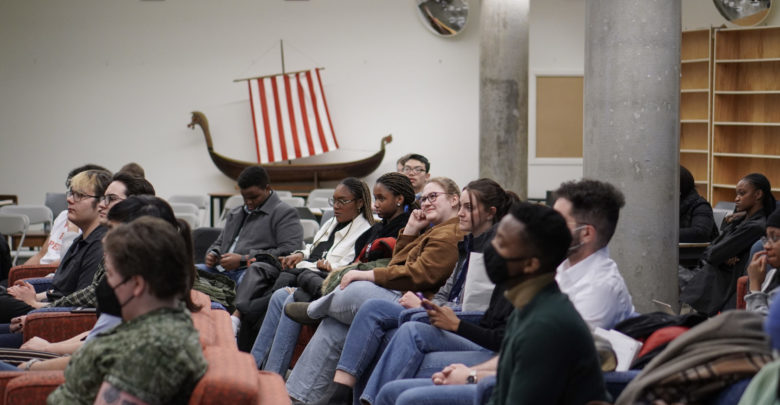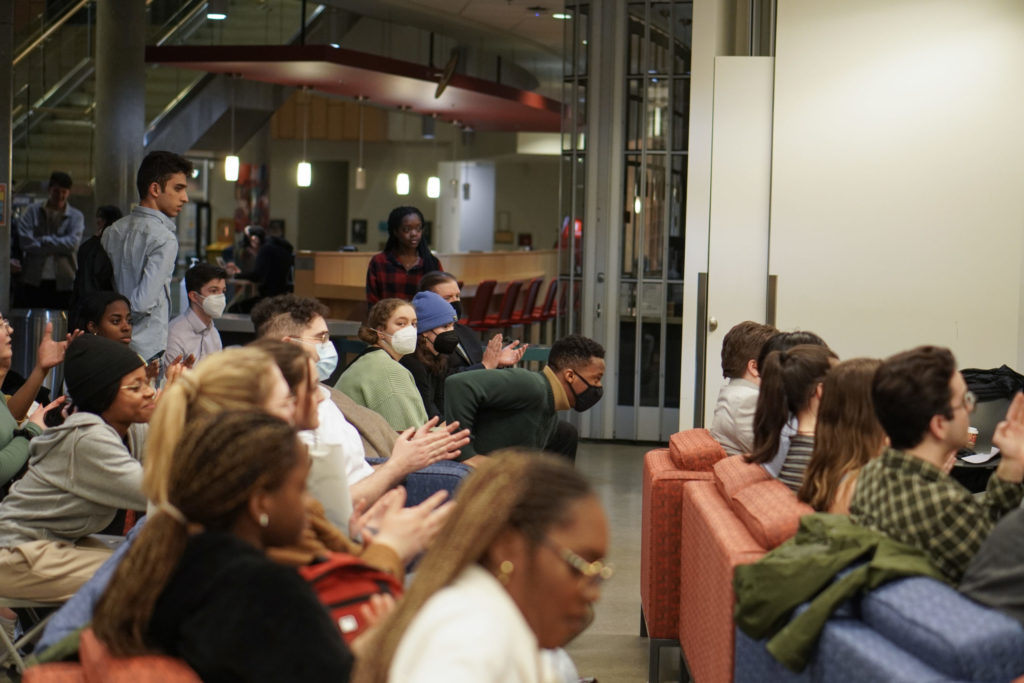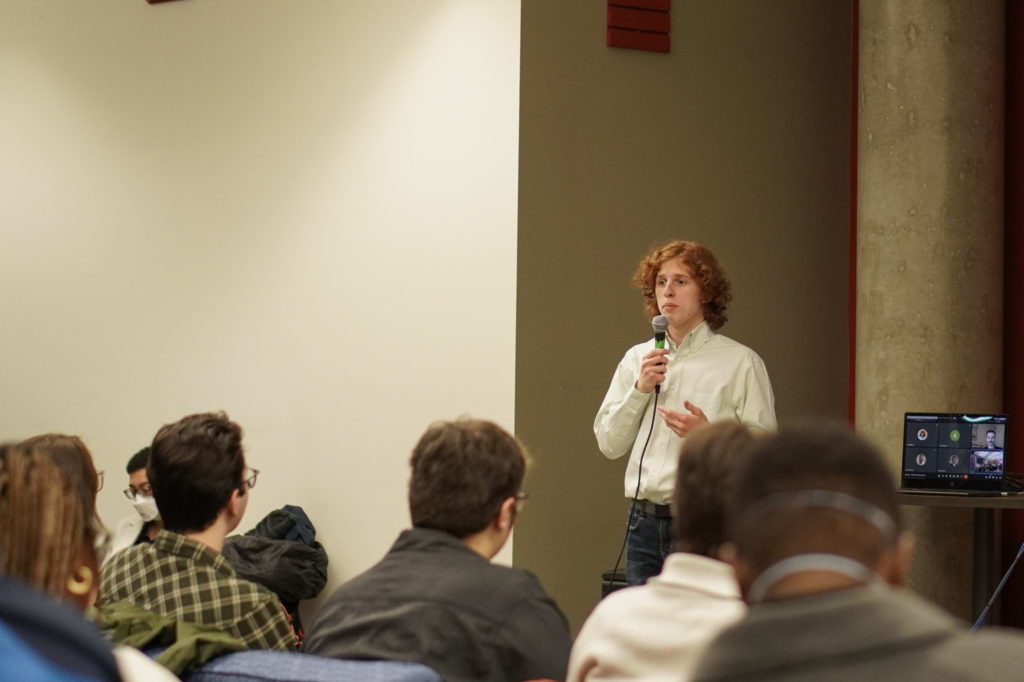SU Elections 2023: Augustana Forum Recap
The fourth University of Alberta's Students' Union 2023 elections forum was held at Augustana Campus in Camrose.
 Jonas Smith
Jonas SmithCandidates in this year’s University of Alberta’s Students’ Union (UASU) elections travelled to Camrose, Alberta on March 6 for the Augustana forum.
The forum was the fourth forum held by the Elections Office, and was an opportunity for students at Augustana Campus to engage with UASU candidates. Each candidate gave an opening statement, which was followed by an audience question period.
Here is the TL;DR version of this forum:
- President: transportation issues, access to services, and differences in advocacy
- Vice-president (operations and finance): technical and transportation issues, business opportunities
- Vice-president (external): transportation issues and building student connections
- Vice-president (academic): student government representation and equal resources
- Vice-president (student life): supports for residence and sexual and gender-based violence
- Board of Governors Representative: academic restructuring without Augustana
Presidential candidates raise transportation issues, and a lack of accessibility to UASU services
Presidential candidate and former arts councillor Haruun Ali began his opening statements by expressing how it was good to see such a good turnout at the forum.
“I’m so happy to see so many people that are actively engaged in governance on campus,” he said.
Ali noted how this was the first time in a number of years that candidates have “shown up” to talk to Augustana students and that he understands their frustrations with the UASU.
“The status quo just doesn’t work for us anymore.”
“Now more than ever students expect their students’ union to be an advocacy body, not a business,” he said. “The reality is that you don’t even see our businesses — we don’t have a Dewey’s or a RATT at Augustana Campus.”
Ali said he will work with the Augustana Students’ Association (ASA) to advocate for a reimbursement program to help Augustana students travel to North Campus. Through his platform promise of creating an advocacy office, Ali hopes to empower Augustana student representatives with research and messaging.
Current vice-president (external) and presidential candidate Christian Fotang began his opening statement by talking about how candidates faced transportation issues getting to Camrose for the forum. He highlighted how these are the transportation issues that Augustana students face every day.
“I mean that’s just a microcosm of what everyday students here face trying to access spaces and access services that are provided at the North Campus,” he said.
“The fact that … you’ve all had to go to this for your entire degree speaks to the level of importance. We have to do to fix transportation on this campus — now, not yesterday, not tomorrow, immediately.”
Fotang said he understands that students at Augustana have felt left behind by the advocacy at the UASU.
“A lot of people have felt like they’re not listened to, right here at Augustana.”
They’ve been left out of important conversations, Fotang explained, by not being consulted with when changes to academic programs have been made — “and that’s just wrong.”
A question from The Gateway asked Fotang how he plans to advocate effectively address transportation issues immediately, in light of his opening statements.
He explained that the City of Camerose has been unwilling to work on this issue with student leaders, and when they have gone to the provincial level, they were sent back to the city.
“There’s been a lot of dancing around and deflected responsibility,” said Fotang.
When they brought this up to the university, “they didn’t even know that the Camrose Connector stopped operating.”
Fotang emphasized that his approach to this issue is increasing awareness of the issue, “creating noise and creating that sense of urgency,” and looking for interim solutions like a reimbursement program — but that a bus was still the end goal.
He raised that the bus is important to the community for people who aren’t students. It is used to get access to hospital and sexual and gender-based violence supports. This can be an approach for getting more media attention for the issue, he said.
A question for Ali from The Gateway asked how his platform promise of creating an advocacy office would extend support to Augustana Campus.
Ali said one of the things he has heard from Student Representative Associations (SRA) is that they want access to research. He wants to help provide that data to inform perspectives and “help bridge that gap.”
A question from Abdul Abbasi, the Augustana councillor, asked the candidates how they will do things differently so Augustana isn’t neglected.
“What we’re going to do is we’re going to build a union, we’re not going to build a business,” Ali said. He spoke about helping Augustana access supports, training new students leaders with the advocacy office, and partnering with the ASA.
Fotang said that his advocacy goes further than his opponent.
“It’s not enough to just keep on saying the same political slogan,” he said. “If my opponent claims that he’s done the research, and done all the networks, and done all the things he needs to know, he would know we already have an SRA specialist, we already have an advocacy office, we already have the supports … we need to support Augustana students here.”
“That’s how we got the sexual violence wellness coordinator hired. That’s how we got a million dollars from the provincial government to support rural communities, which Camrose can qualify for.”
Fotang said that too many candidates rely only on regular meetings for their platform points on Augustana.
“Good advocacy should not have to depend on a good Google Calendar schedule. It should be entrenched in university policy.”
-Emily Williams

VP Ops and Fi candidates discuss technical issues, business opportunities, and transportation issues
In his opening statement, Fateh Arslan emphasized the importance of communication between North Campus and Augustana Campus.
“Communication, communication, communication. This is what is needed here. This is what is needed from me. This is what we need to work on.”
Arslan added that he hopes to build a connection with the incoming ASA executives.
Levi Flaman touched on the technical difficulties Augustana students often face when trying to enter buildings with their OneCards in his opening statement.
“I often hear from Rob Ford, working at the OneCard office complaining about how door access is terrible. Readers tend to go out. Students have card problems.”
Flaman said he has spoken with Jewel Naicker, the current president of the ASA, about potential business opportunities for the ASA.
“In talking with Jewel, we were talking about the potential of opening a pub here — that might not be feasible. But there might be other business opportunities that we can have for the ASA.”
Flaman talked about a potential shuttle service between Augustana Campus and North Campus.
“I think that rather than waiting for somebody to do it, we should just do it ourselves because we are the masters of our own destiny.”
-Dylana Twittey
VPX candidate discusses transportation issues at Augustana
Vice-president (external) candidate, Chris Beasley, discussed transportation issues that Augustana students face.
In his opening remarks, Beasley shared that he had served as the chair of the Council Administration Committee. He added that he was the last individual to organize a council trip to Augustana campus.
“That’s because I honestly cared about listening to students and talking to students,” Beasley said. “I’ve been listening to students who are talking about their priorities, especially as it relates to transport and advocacy with provincial governments.”
Beasley added that these issues need to be top priority for the vice-president (external). He also acknowledged that years of underfunding and campus issues are things that cannot be easily undone.
“A lot of people are going to come up here and over promise. They’ll tell you that they can change years of underfunding and years of problems that have existed between North Campus and Augustana.”
“What I’m here to do is promise that I can do better, and that I’ll do things within my power to help support our standard,” he said.
Beasley said he plans to support Augustana campus through frequent visits, discussing strategies with students, and preparing them for advocacy.
“I want to build that capacity for you guys to be able to do the work that you need to do.”
An audience member asked Beasley how he plans to contribute to solving the ongoing transportation issue on Augustana campus. Beasley said that he believes it’s a complicated issue that will take a lot of hard work.
“This is a conversation that I want to have early in my term, so we can adopt a successful strategy,” Beasley said.
“It’s likely going to involve cameras and newspapers, and likely a lot of public pressure to show that this is an issue that Augustana students are facing … I don’t have a plan yet, but I’m very interested to build one with you guys.”
-Sophie Jickling
“Augustana has been used for experimental changes,” says VPA candidate
Pedro Almeida, vice-president (academic) candidate, began his opening remarks by discussing his plan to push for more hybrid learning, and an online advising hub. Almeida said that if elected, he’ll “be fighting for do-able goals that are applicable to Augustana.”
“Augustana has been used for experimental changes that the students have not been consulted on,” said vice-president (academic) candidate Rowan Morris in his opening remark. Morris touched on his plans for regularly meeting with the ASA, and expanding funding or sponsorships for Augustana students to be able to advocate in-person.
Milan Regmi, vice-president (academic) candidate and current education councillor, then said he planned to work with the executive committee, “to fight for more seats for historically underrepresented faculties … including Augustana.” Regmi added that he plans to consult Augustana students, especially international students, in the case that there are threats of future funding cuts.
During question period, the vice-president (academic) candidates were then asked how they plan on supporting Augustana students in leadership positions.
Almeida answered that through re-organizing the vice-president (academic) schedule, he would be able to meet regularly with the ASA, to better address specific issues for each campus and faculty.
“The purpose of that is to ensure the smaller faculty associations have those opportunities to meet,” said Almeida.
Morris then answered that, “one of the biggest ways I believe the Students’ Union has neglected your needs is through the ways that we enrich the lives and leadership abilities of other student representative associations.”
Morris continued that he would like to see the inclusion of ASA members in the council training camp, Governance Camp, as well as a mentorship program for student governance at Augustana.
Regmi said he’d like to see the SRA Summit brought back. “Not only bring it back,” Regmi continued, “but expand across it.”
“I want to make sure there’s monthly meetings with the vice-president (academic) of Augustana,” continued Regmi. “That way we can not only treat Augustana as our problem, but we can also focus on what the concerns of Augustana students are.”
Lastly, candidates from all the executive positions were asked on how they planned to ensure Augustana students had the same resources as students on North Campus, specifically in terms of transportation and connection. Morris and Regmi responded.
Regmi said that he plans to provide more online resources so that Augustana students don’t have to travel to North Campus for some of those resources.
Morris responded that online resources don’t go far enough, and that some resources from North Campus could be franchised to Augustana, like the Peer Support Centre.
“Saying we’re only going to do online things for you folks is not enough. So I propose that you start to look inwards as to what resources Augustana can offer.”
-Amanda Sparks
VPSL discusses sexual and gender-based violence supports, and residence on Augustana
Vice-president (student life) candidate, Michael Griffiths, began his opening statement by discussing the treatment toward Augustana campus, and his plans to improve representation.
“Your campus is as important as any other — often forgotten about, neglected, and tokenized. I want to assure you that I am here to represent you folks at Augustana and fight for what you deserve,” he said.
Griffiths mentioned that he had conversations with the ASA, specifically Naicker, in order to understand what Augustana needs. If elected, Griffiths said he will continue this consultation.
He added that he would like to help the campus create an Augustana Residence Association (ARA). Additionally, he said he wants to increase sexual and gender-based violence prevention measures, and bring in pilot programs to Augustana.
During question period, Naicker asked why the creation of the ARA is a central platform point for Griffiths, adding that there was no consultation with Augustana students expressing this need.
In response, Griffiths emphasized that consultation ongoing.
“It is my responsibility if elected to continue those talks … to assure that this is something that you folks want.”
Griffiths said that the creation of the ARA is an ongoing initiative from the current vice-president (student life) Joannie Fogue, and students on Augustana Campus.
They added that the creation of the ARA could aid students in getting “the representation that they need,” and that it would be irresponsible to make decisions regarding Augustana’s residence without “the proper bodies in place to meaningfully engage and consult with.”
The Gateway asked Griffiths to clarify if his plans to improve various aspects of residence life, such as changing meal plans and compensating student leaders, extend to Augustana’s student residence.
“These are initiatives that we can work on across campuses, and that really has to start across campuses,” Griffiths said.
“These discussions occur at really high-level meetings. So I want to be able to consult with Augustana folks and bring that voice to these meetings to really ensure that it gets done, because they’re not isolated issues for Augustana.”

A member of the audience then asked Griffiths about his plans to improve sexual and gender-based violence support on Augustana campus, as there is only one sexual violence coordinator available for the entire campus.
In response, Griffiths mentioned plans to hire another trauma counselor. Additionally, he mentioned implementing the U of A’s new sexual and gender-based violence policy that was revised in November of 2022.
“A policy is no good if it sits on a website on North Campus and doesn’t have any actual meaningful action behind it,” he said.
-Olivia O’Neill
BoG representative outlines how Augustana is left out of the college model
Stephen Raitz, the sole candidate for the Board of Governors (BoG) representative role, attended the Augustana forum online.
In his opening remarks he said, “this is a volunteer position, there is no support. You really need to work with others, like the Students’ Union, the ASA, and other board members to affect change.”
Raitz explained how the U of A is going through an academic restructuring process and that, “Augustana actually sits outside of the college model.”
Additionally, due to this exemption from academic restructuring, he described that Augustana has to be considered when assessing the new administrative structure.
“We have to have special consideration for how experiences at Augustana have been with academic advising or other kinds of interaction — with the people who support you in your education.”
Raitz then left the meeting early due to a prior commitment, and changes to scheduling.
-Lale Fassone
Every year, The Gateway publishes hundreds of articles like the one you just read that are free for everyone to access. But The Gateway needs your support to continue publishing its award-winning journalism. Please consider donating today, even a small amount can help the University of Alberta’s only newspaper continue serving the campus community. Thank you.




